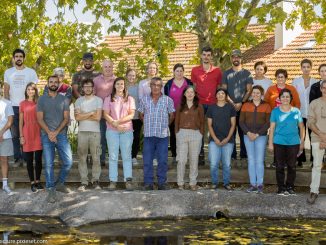By Mumta Ito
On 29 March 2017, Nature’s Rights – a non-profit organization seeking to establish legal personality and rights for ecosystems and species – held an event (Figure 1) at the European Parliament in Brussels, to launch its initiative in Europe and to explore the possibilities that recognizing nature’s rights could offer. Co-hosted by Pavel Poc, Benedek Jávor and Marco Affronte (Members of the European Parliament [MEPs]), the event brought together a high-level panel to discuss how recognizing nature’s inherent rights in law might help to create the paradigm shift needed for humans to live more sustainably and harmoniously, and within our planet’s limits. In the panel, I was joined by:
- Hans Bruyninckx (Executive Director, European Environment Agency);
- Luc Bas (Director of the European
- Regional Office, International Union for Conservation of Nature [IUCN]);
- Professor Massimiliano Montini (Fellow of the University of Siena and the University of Cambridge);
- Sirpa Pietikäinen (MEP);
- Jen Morgan (Systems Change Consultant).
As ancient as they are new, the rights of nature – and their underlying philosophy of Earth jurisprudence – are growing in significance as more and more countries adopt them at national and local levels, as well as in court decisions. In March 2017 alone, the rivers Whanganui, Ganges and Yamuna were all granted legal personality and rights (the first rivers to be given such status). In Europe, however, the rights of nature are yet to come, as I noted at the meeting:
In our current system of law, ecosystems and living species are treated as objects, property and resources – whilst corporations are made subjects of the law with legal personality and rights. This enables an economic system based on unlimited growth that is coupled with the destruction of nature. Our current system of environmental law simply manages the externalities of business as usual without addressing root causes. It can only slow the rate of degradation – it cannot stop or reverse it.
Humanity is facing unprecedented global environmental problems, and experts, non-governmental organizations and environmental institutions have been working for years to develop ways to protect ecosystems against the harms of economic development. “Current indicators, focused on economic growth, don’t reveal how [un]sustainable our development really is,” observed Luc Bas. “Incorporating the value of natural capital in economic decision-making,” he added, has been presented as one way to address this. “However, to prevent a commodification of nature, approaches such as the rights of nature need to be part of the debate.”
This is why the IUCN, the leading global authority on nature conservation, adopted rights of nature in its resolutions and 2017–20 work programme. Additionally, the United Nations’ Harmony with Nature network has over 200 experts devoted to promoting Earth jurisprudence and nature’s rights as a systemic solution to support the sustainability transition.
The organizers were very pleased with the success of this conference on the rights of nature at the European Parliament. Through this, we feel that the EU hasbegun to catch up with the international trend and started to look into possibilities of adoption of the rights of nature.

As was reiterated by Hans Bruyninckx in his keynote speech, the causes of climate change – to cite a major threat to the thriving of nature – are systemic. Current approaches may get us to goals for 2030, he opined, but to get us to where we need to be by 2050 we must look at systemic solutions.
Adopting rights of nature in EU law and policy would not only help to deal with current environmental issues but also induce a profound change in the way that nature in Europe is perceived and protected in the future. Integrated across all policy areas it has the potential to bring lasting systemic transformation.
One way to bring rights of nature onto the European legislative agenda is to initiate a European Citizens’ Initiative (ECI), which is a democratic mechanism open to citizens of the EU. Nature’s Rights is proposing an ECI to include the rights of nature in EU law and policy. This is a development that is long overdue, as Pavel Poc explained: “Decades of insane growth worship brought us to the edge of the cliff. Now it is time to look underfoot and stop, otherwise nothing follows but a deep, deep drop.”
The Conscious Lawyer – bringing law and consciousness together. Check out our article on Page 8. https://t.co/AdThZNWaYR #NaturesRights pic.twitter.com/n9EsB0y2ly
— Nature’s Rights (@NaturesRights) June 29, 2017
About the author
Mumta Ito is a lawyer and the Founder of Nature’s Rights, which is based in Findhorn, UK.
About Nature’s Rights
Nature’s Rights (previously known as Rights of Nature Europe) is a young international non-profit organization committed to establishing rights of nature in law and policy in Europe and around the world and to transforming our inner and outer relationship with nature. With its international network of experts and volunteers, it works to address the systemic root causes of the interconnected global challenges that humanity faces today. To find out more, visit www.natures-rights.org or follow @NaturesRights on Twitter.





